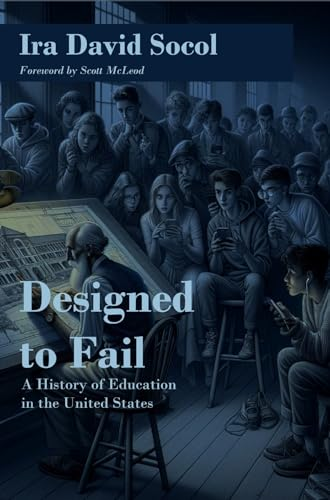Designed to Fail: A History of Education in the United States
Ira David Socol’s Designed to Fail: A History of Education in the United States (2024) is a bold and necessary examination of the deeply entrenched structures that have shaped American schooling. Rather than treating the failures of public education as accidental or the result of bureaucratic inefficiency, Ira argues convincingly that many of these systems—standardized testing, rigid schedules, age-based progression, and compliance-driven classrooms—were intentionally designed to control and marginalize certain populations. His historical analysis exposes how schools have long been used as tools of assimilation, stratification and competition, reinforcing societal, economic, and religious-based hierarchies rather than fostering genuine learning for all students.
What sets Designed to Fail apart is Ira’s ability to connect historical injustices with present-day educational struggles. He does not mince words when it comes to exposing the roles of Elwood Cubberly, Lewis Terman, Horace Mann, Henry Bernard, and non-educators like Woodrow Wilson and Thomas Jefferson (there are many more). Ira doesn’t just critique the system; he offers concrete pathways for reimagining learning beyond the factory-model constraints that still dominate today. As someone who has worked within the system and seen both the promise and the limitations of reform, much of which was demonstrated by Ira along his education partner and co-author Pamela Moran, former Superintendent of Virginia’s Albemarle County Public Schools, (Timeless Learning: How Imagination, Observation, and Zero-Based Thinking Changes Schools, 2018), I found Designed to Fail to be a powerful validation of the need for systemic transformation. It challenges educators, policymakers, and communities to rethink what education should be—beyond compliance and toward real, meaningful learning experiences.
This book belongs in the hands of everyone who wants to shed the past shortcomings of school reform and instead truly transform teacher-student-school learning and relationships.
What sets Designed to Fail apart is Ira’s ability to connect historical injustices with present-day educational struggles. He does not mince words when it comes to exposing the roles of Elwood Cubberly, Lewis Terman, Horace Mann, Henry Bernard, and non-educators like Woodrow Wilson and Thomas Jefferson (there are many more). Ira doesn’t just critique the system; he offers concrete pathways for reimagining learning beyond the factory-model constraints that still dominate today. As someone who has worked within the system and seen both the promise and the limitations of reform, much of which was demonstrated by Ira along his education partner and co-author Pamela Moran, former Superintendent of Virginia’s Albemarle County Public Schools, (Timeless Learning: How Imagination, Observation, and Zero-Based Thinking Changes Schools, 2018), I found Designed to Fail to be a powerful validation of the need for systemic transformation. It challenges educators, policymakers, and communities to rethink what education should be—beyond compliance and toward real, meaningful learning experiences.
This book belongs in the hands of everyone who wants to shed the past shortcomings of school reform and instead truly transform teacher-student-school learning and relationships.

No comments:
Post a Comment
Please feel free to leave a comment that is relevant to this post. Thanks!